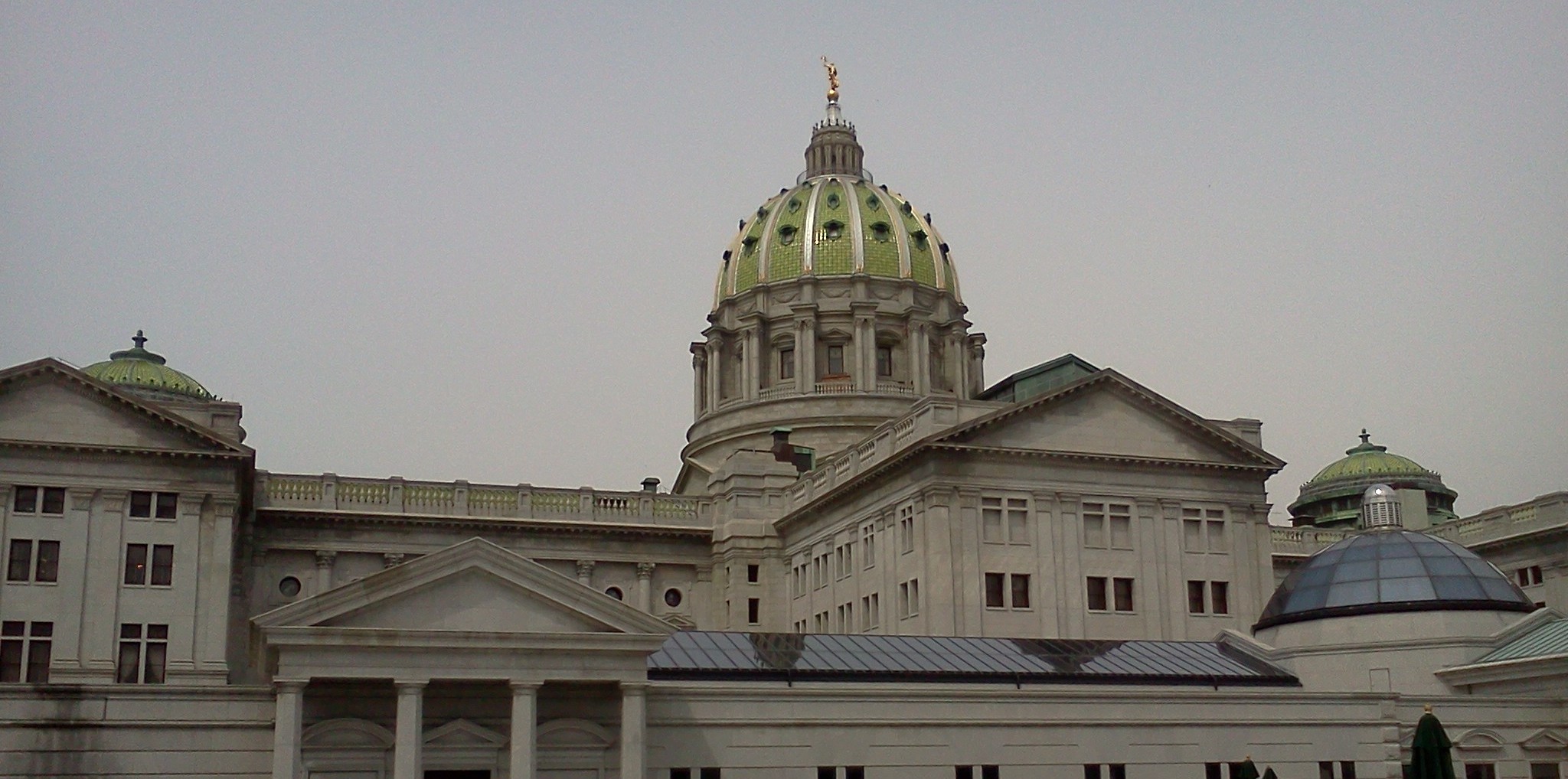Posts
Governor Tom Corbett on his education reform plan stalling in the legislature
/in Ask the Governor, Media, News, Video /by PAMattersSenate Approves Education Reform Bill
/in News /by PAMattersA revamped version of SB 1 attempts to address three of the four tenets of the governor’s education reform agenda. Throughout hours of Senate debate, Wednesday, there appeared to be broad support for the expansion of Educational Improvement Tax Credits and updates to the state’s charter school law. However, a school vouchers program proved controversial.
“Over 90% of the kids are still going to be at the old school,” said Sen. Daylin Leach (D-Montgomery). “They are just going to have less resources to try to eke out an education.”
The amended voucher program in SB 1 would make the per-student state education subsidy available to low-income students, in the worst-performing 5% of schools, to help them attend the public or private school of their choice. Students whose families earn up to 130% of the federal poverty guidelines would receive a full voucher, while students whose families earn up to 185% of the federal poverty guidelines would be eligible for three-quarters of the per-student state subsidy. The impacted schools are located primarily in Philadelphia, Harrisburg, Allentown, Pittsburgh and Reading.
“If this bill was a bill that would require statewide vouchers, I would vote against it,” said Democratic Education Chairman Andy Dinniman (D-Chester). “But this bill is a very limited bill that is aimed to help students in 143 buildings in this commonwealth, out of thousands of school buildings in this commonwealth.”
The bill ultimately passed 27 to 22,and now heads to the House. Governor Tom Corbett has not yet endorsed SB 1, but says he has been working with lawmakers behind the scenes.
Governor Tom Corbett on his education reform plan, specifically school choice
/in Ask the Governor, Media, News, Video /by PAMattersVouchers: The Most Controversial of the Education Reforms
/in News /by PAMattersSchool choice is not a new issue in PA, and it was no surprise when Governor Corbett included school vouchers in his education reform agenda. In fact, several protesters gathered in York in anticipation of what they were about to hear. “65% of Pennsylvanians do not support using public money to pay private school tuition and only 11% of Pennsylvanians strongly support a voucher program,” says Cumberland County parent Susan Spicka. “If the majority of Pennsylvanians do not support vouchers, I don’t know why he does.” Spicka was citing a recent poll released by the Pennsylvania School Boards Association (PSBA).
The Corbett plan calls for opportunity scholarships to be made available to low-income students in the worst performing 5% of schools. The Opportunity Scholarship Program would allow eligible students to use state tax dollars to help pay tuition at the public or private school of their choice. “What moves to the new school is the state subsidy, the old school still keeps its taxes in their school district,” Corbett says. Students whose families earn 130% of the federal poverty level would be eligible for the full scholarship. “To give that to you in dollars and cents,” Corbett says, “That’s a family of four earning $29,000.” Students whose families earn 185% of the federal poverty level would be eligible for 75% of the scholarships.
Opponents say vouchers don’t work. “Vouchers, as proposed, would still leave a large number of students in those underperforming buildings,” says PSBA Director of Research Services, David Davare, who released a new research paper touting alternatives to raise student achievement in underperforming schools.
“The issue is not that vouchers don’t work, the issue is the current system doesn’t work,” says Otto Banks, executive director of the REACH Alliance & Foundation, who says many students are trapped in failing schools simply because of their ZIP code. “Vouchers are simply a means to an end,” Banks tells Radio PA. “It gives a child an opportunity, or access to a quality education.” REACH strongly supports the governors’ education reform agenda.
Corbett Unveils School Reform Agenda
/in News /by PAMattersThe new education paradigm that Governor Tom Corbett envisions would put students first. While visiting the Lincoln Charter School in York, Corbett put forth a four point plan that he wants to see implemented in time for the 2012-2013 school year.
It starts with a revamped charter school law in Pennsylvania. “My plan calls for a state commission to approve and to oversee the charter schools of Pennsylvania,” Corbett says, adding that the commission of experts would also have the power to pull the plug on charter schools that aren’t meeting educational standards.
Controversial school vouchers also make an appearance, but they would only apply to low-income students in the lowest performing 5% of PA’s schools. “Students whose families earn 130% or less of the federal poverty rate would be eligible for these scholarships,” Corbett says. “To give that to you in dollars and cents, that’s a family of four earning $29,000.” Students who come from families earning slightly more would be eligible for a portion of the so-called opportunity scholarships.
The new teacher evaluation program that Corbett envisions would include student performance. “Right now the evaluation system is merely a rubber stamp, and it must change if our students are going to be the beneficiaries of good, committed educators,” Corbett says. The current system allows only for a satisfactory or unsatisfactory rating. The new system that’s currently being piloted would allow for ratings that range from distinguished and proficient, to needs improvement and failing.
The state House has already passed a bill that encompasses Corbett’s fourth goal of expanding the Educational improvement Tax Credit (EITC), which is awarded to businesses that fund scholarships and other educational improvements.
Corbett concluded that he’s not happy with the status quo. “When we have failing schools, we have failing students,” he says, pointing to the School District of Philadelphia’s 45% drop out rate. Reaction to the Corbett agenda is rapidly pouring in; check back later for a recap.
Committee to Consider Charter School Reforms this Fall
/in News /by PAMattersPennsylvania’s charter school law was considered one of the nation’s best when it was enacted in 1997, but 14-years later many are calling for reforms. “A number of states… have surpassed the Commonwealth of Pennsylvania in adopting stronger charter laws, all with the goal of making charter schools more viable and a high quality option,” says Senate Education Committee Chairman Jeffrey Piccola (R-Dauphin). Piccola convened a capitol hearing, Thursday, on his comprehensive, 145-page charter school reform legislation.
The bill has been two years in the making and has some bipartisan backing. Minority Chairman Andy Dinniman (D-Chester), one of the bill’s cosponsors, says it insists on transparency and accountability. “We say, are you fiscally accountable? Do you provide what you need to provide at the best cost and in the most productive manner?”
SB 904 would – among other things – create an independent commission to oversee and authorize Pennsylvania’s charter schools, allow for direct state funding of charter schools, and create a new task force to investigate funding issues. Pennsylvania currently has 90,000 students enrolled in charter schools, and 30,000 students on waiting lists. Most of the students waiting for charter school slots are in Philadelphia.
The committee’s charter school reform push isn’t without its critics though. The Pennsylvania School Boards Association testified that almost all charter school funding is provided by the districts, and SB 904 does not provide any meaningful funding reform. State Senator Daylin Leach also raised concerns about the impact on the schools that students are leaving. “It is a net loss to the school, and since the school is just a building, it is a net loss to the other students who are in that school.”
Sen. Piccola anticipates action on charter school reform this fall. Other big education issues, on the horizon, include school vouchers and mandate relief.
State House Committee Holds Hearings on School Choice, Charter Schools
/in News /by PAMattersThe State House Education Committee opened two days of informational hearing today on school choice and charter schools today. The state education secretary has laid out the Corbett administration’s views on school choice.
Ron Tomalis told the Committee we must ask ourselves why we force parents to send their children to a particular school rather than allow them to choose another school that might meet their needs. He says students in the lowest 5% of schools, based on the combined math and reading scores in the Commonwealth, should have the opportunity to use state funding to attend another public school or a participating nonpublic school.
Tomalis says the program must be targeted to students trapped in failing schools and be accountable to taxpayers. He says only the state portion of funding would follow the child. He says the administration believes choice needs to be phased in.
Tomalis says students taking advantage of choice should be held to standards and should be required to take an assessment to measure their academic achievement.
Tomalis says school choice is not just public to private. He says public to public choice is an important aspect of the choice program. He says they should promote the ability for students to transfer across district lines. He believes school districts will embrace the potential for public to public choice. But he says it would be difficult for him to support a mandate that schools participate.
Tomalis also told the committee the administration is looking at taking the growth of student achievement into account when identifying whether schools are hitting their targets. He says growth has to be part of the mix.
The head of the Pennsylvania State Teachers Association is questioning how the Corbett administration could support school vouchers. In a statement, James Testerman said “This kind of spending is reckless, ill-advised, and dangerous for the students who learn in Pennsylvania’s public schools.”
There are several school choice measures before the legislature, including Senate Bill 1 and several measures in the house.
Welcome to PAMatters.com, a new source for news and commentary from Pennsylvania’s capital. In addition to video, audio and pictures from the stories and events that affect YOU, you’ll also get some behind-the-scenes analysis via blogs from our award-winning staff of journalists.








